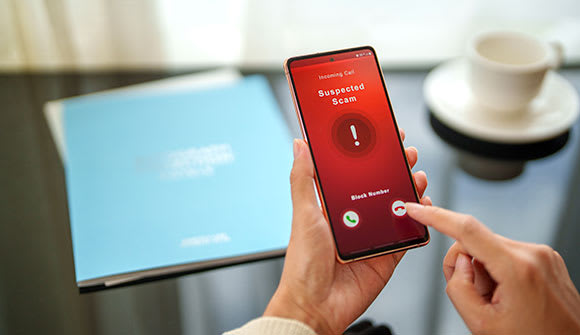Outsmart the scammers
Tips to protect yourself against health care-related fraud.
Article Author: Juliette Allen
Article Date:

You open your front door one day to find a package of medications you never ordered.
Your latest health insurance statement lists services provided on a date you never had an appointment.
You get a phone call supposedly from your doctor’s office, but they’re asking for personal information they should already have (if they even need it, at all).
Do any of these scenarios sound familiar? They’re just a few of the health care-related frauds and schemes targeting people in Northeast Florida and throughout the country. The scammers’ goal? To profit from the payouts for services, medications or supplies that were never needed or ordered.
Identifying fraud
In order to keep yourself safe from scams, you first have to recognize the red flags. Andrea Eklund, JD, CHC, CHPC, chief compliance officer for Baptist Health, said it can be tough to recognize fraudulent phone calls because phone numbers can be spoofed – meaning your phone’s caller ID shows a number you’re familiar with (like your provider’s office) when it could be a scammer on the other end.
“If you receive a call that you’re not expecting, pause and think,” she said. “Tell the person you’re going to hang up and call your provider directly. If the caller starts getting aggressive or pressuring you to give personal information, it’s a red flag.”
Tips to stay safe from scammers
Some scams start more subtly and are easier to miss. For example, if a fraudster has your insurance information, they can file a claim for services never rendered or attempt to order supplies you don’t need. The fraudster gets the reimbursements from your insurance company, and you may be left with a small bill that takes more effort to contest than pay. Or, if you’re not looking over your statements regularly, you may miss the fraudulent claim altogether.
To help keep yourself and your loved ones from falling victim to fraud, Eklund suggested these three tips:
- Protect your health insurance card the same way you would your credit card. Keep it in a secure place and out of the view of potential bad actors. Don’t share this information with individuals who don't have a need to know.
- Carefully review your insurance statements to make sure there are no erroneous claims for products or services.
- Don’t share your personal information (like name, social security number or health insurance number) with anyone who contacts you by phone, email or in person. Take the extra steps to independently confirm the person is who they say they are. Note: It’s common practice for your health care provider to confirm your identity when you contact them. In doing so, they may request your date of birth and/or the last four digits of your social security number.
“Often, scammers will have just enough of your personal information to convince you they’re legitimate, and then ask you to confirm the rest to fill in what they’re missing,” warned Eklund. “For example, the scammer may provide your address or other publicly available information.”
She added, “If you’re ever in doubt about whether to give information to someone over the phone, by email or any other way, don’t do it,” she said.
If you have questions about an unexpected call you receive or from an unknown third-party where a person requested personal information from you or recommended supplies or services, contact your provider. If you’re looking for a provider, call 904.202.4YOU (4968) or visit baptistjax.com/newdoctor.
For more tips to protect yourself and your family from potential scammers, check out this tip sheet from the Centers for Medicare and Medicaid Services.



